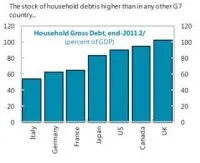We must spend less on housing
Published: by Toby Lloyd
The news has been worryingly free of house price stories of late, forcing some papers to fill pages with minor distractions like the Olympics, Leveson and the great summer weather.
Thankfully the IMF has come to the rescue of editors everywhere, with its annual report on the UK economy suggesting that house prices still need to fall by 10-15% now-ish – and by up to 30% to get back to trend.
Inevitably, the response from some quarters will be for the Government to do something, which always comes with a price tag.
With budgets everywhere being slashed, you don’t get many charities calling for their patch to be cut. We tend to make the case for why our bit should be spared the axe.
But I reckon we should be spending far less than we currently do on housing ourselves as a nation.
Firstly, there’s the fact that we spend £22 billion a year on housing benefit – about twenty times what we spend on building affordable homes. As we’ve argued before, this is a ridiculous state of affairs – but you won’t fix it by cutting housing benefit for those who have the temerity to be unable to afford sky-high private rents.
You fix it by ensuring more people don’t need benefit just to keep a roof over their heads, which means building more affordable homes, and by making the homes we already have more affordable.
Calling for more public investment into home building runs straight into the arguments about whether more public borrowing is a good idea (it’s cheap right now, there’s lots of spare capacity and unemployment) or economic and political suicide (there’s a public debt crisis out there, polling shows the public support deficit reduction).
So the consensus seems to be that we need more private investment – and more private borrowing. On 5 July there was a further £50bn of quantitative easing, then last week the new Funding for Lending scheme was launched, promising to pump £80bn of credit into loans, including mortgages. And this is where it gets worrying.
What both sides of the debt debate ignore is the fact that private debt is still astronomically high. More borrowing for productive enterprise – ie to create real growth – may be needed, but mortgage borrowing doesn’t do this. As this natty animation shows, most of it goes into inflating the price of existing homes – ensuring that all those rentysomething wannabe first time buyers remain priced out for good, unless of course they have family rich and generous enough to help them. Do we really want to go back to a model of property ownership based strictly on inheritance rather than earning? The cunning plan to pump more credit into mortgages seems more orientated to promoting a new house price boom than stimulating economic growth.
When our housing costs are already the third highest in Europe, why should we want to make it worse?
The IMF report also shows that UK household debt is the highest in the G7 at over 100% of GDP – and the vast bulk of that is mortgages. As the IMF pointed out in April, the countries that are suffering the worst recessions are those that built up lots of household debt though housing bubbles. The new report includes some truly scary graphics on p23 of the role of the housing market in our current economic woes.
So there you have it: we need to spend much less on buying homes in future – not only would this enable us to spend the money on growth-fuelling investment, it might even allow us to buy, rent and build more homes without busting the bank, literally.
